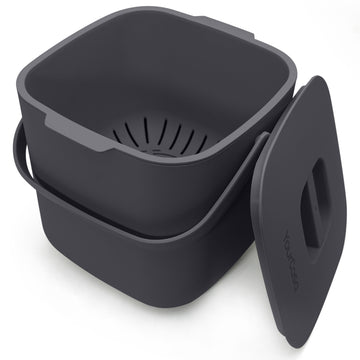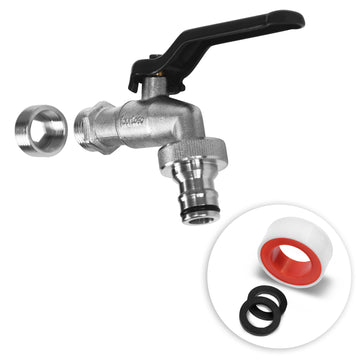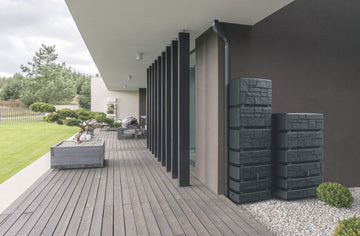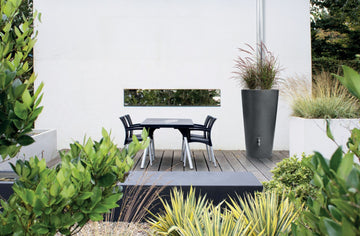Common composting mistakes: How to avoid and solve them
by Robert Zielinski on May 29, 2024
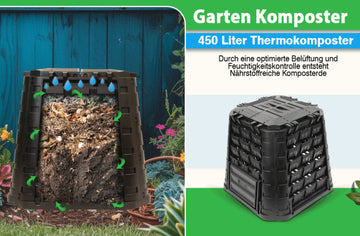
Composting is definitely part of sustainable gardening . It allows you to turn kitchen and garden waste into nutrient-rich fertilizer that enriches the soil and promotes plant health. But all too often, novices in particular make mistakes that render the composting process ineffective and reduce its benefits. From the wrong composition of the compost material to insufficient aeration, such mistakes can slow or even stop the decomposition process.
How to avoid common composting mistakes? To avoid common composting mistakes, maintain the right balance of "green" (nitrogen-rich) and "brown" (carbon-rich) material. Ensure adequate aeration by turning the compost regularly. Avoid adding cooked food scraps, meat or dairy products as these can attract bugs and cause bad odors. Keep the compost moist but not wet to encourage healthy decomposition. Check regularly for unwanted odors and pests to intervene early.
In this article, we'll show you how to recognize, avoid and solve these common mistakes - so that your garden can thrive and you can support the environment in the long term.
Which materials are not allowed in the compost?
A well-functioning compost pile can convert a wide variety of organic waste into useful fertilizer . However, there are certain materials that don't belong in the compost bin because they can interfere with the decomposition process, attract pests, or be harmful to your health. Here's a breakdown of the materials you should avoid and what you can do with them instead:
| material | Why not compostable? | Alternative disposal methods |
| Meat | Attracts pests and causes unpleasant odors. | Put it in the residual waste or use special organic waste bins. |
| Dairy products | Similar to meat, they can attract pests and develop unpleasant odors. | Residual waste or special collection points for organic waste. |
| plastic | Does not decompose and can release harmful chemicals. | Recycling or special collection points for plastic waste. |
| Cooked food | May contain oils and salts that spoil the compost and attract pests. | Residual waste or closed organic waste bins to keep pests away. |
| Diseased plant material | Can carry diseases or pests into the compost. | Burn or dispose of in the trash to prevent spread. |
If you avoid throwing these materials onto your compost heap, the decomposition process will continue smoothly and almost automatically in the long run .
How moist should the compost be?
The ideal moisture level of a compost pile is similar to a wrung-out sponge - damp, but not dripping wet. This is crucial to the health of your compost, as the microorganisms that power the composting process need water to effectively break down the organic materials.
If the compost is too dry, decomposition will slow down ; if it is too wet, it can lead to a lack of oxygen and unpleasant odors. To regulate the moisture, you can do the following:
- Add dry material such as straw or shredded leaves if the compost is too moist
- Mix in water and moist material such as fresh kitchen scraps if it seems too dry
It is important to check the moisture level regularly by taking a handful of compost and pressing it lightly. This is the best way to estimate the water content.
How important is aeration for compost?
Without good ventilation, your compost won't do much - because the microorganisms that feed on the materials in the compost pile also need oxygen. Without sufficient air circulation, the compost can become oxygen-poor, which leads to slow decomposition and unpleasant odors.
This is exactly why you should regularly turn your compost pile . This not only promotes the flow of oxygen, but also prevents the formation of mold and rot inside.
Alternatively, using a vented composter like the EcoFusion can help improve air circulation. Good ventilation allows materials to break down faster and avoids the build-up of odors - making the whole process much more efficient and pleasant.

What nutrients does compost need?
A balanced supply of the right nutrients is essential for your compost. The key factor here is the right balance between green and brown materials.
Green materials are rich in nitrogen and promote the growth of the microorganisms responsible for decomposition. Brown materials, on the other hand, provide carbon , which improves soil structure and keeps the compost stable.
Experiment with different materials and see how they affect the compost - after all, every garden composter works a little differently depending on the oxygen and moisture levels. Here are some examples that you can use to enrich your compost:
| Material type | Examples | nutrient | Function in compost |
| Green material | Vegetable waste | Nitrogen | Accelerates the decomposition process |
| Green material | Lawn cutting | Nitrogen | Adds moist, nitrogen-rich layers |
| Green material | Coffee grounds | Nitrogen | Promotes rapid decomposition and microbial activity |
| Brown material | leaves | carbon | Stabilizes the structure of the compost |
| Brown material | Cardboard | carbon | Binds moisture and keeps the compost loose |
| Brown material | straw | carbon | Adds structural strength and aerates the pile |
By cleverly combining these and other materials, you can create a nutrient-rich compost that optimally enriches your garden soil.
Why is my compost heap decomposing so slowly?
If something is wrong with your compost heap, it may be that decomposition is taking place more slowly than usual . The first thing to do is to find out why. Often, however, the ratio of carbon (C) to nitrogen (N) is not quite right.
Carbon, found in brown material such as leaves and cardboard, is the energy source for the microorganisms , while nitrogen, abundant in green material such as vegetable scraps and grass clippings, is essential for the growth of these organisms . An ideal C/N ratio, according to most research, is about 30:1.
If this ratio is not balanced, it can slow down the decomposition process . To correct the ratio, add more green material if the compost is breaking down too slowly, or more brown material if it is breaking down too quickly and smells bad. Check regularly to make sure the decomposition process is proceeding as it should. If not, make the necessary corrections as soon as possible.
Why does my compost heap smell unpleasant?
Bad smells in a compost pile can have a variety of causes - including a lack of oxygen, too much moisture or an imbalance in the material mix . If the compost is not sufficiently aerated, an anaerobic state develops in which unfavorable bacteria multiply. This leads to unpleasant smells that are often reminiscent of rotten eggs or ammonia.
With the help of a few simple measures, you can effectively prevent bad smells in your compost heap:
- Turn regularly: Turn the compost at least once a week to ensure even aeration.
- Balanced material ratio: Maintain a good balance between green (nitrogen-rich) and brown (carbon-rich) material.
- Use composters with air vents: Composters with built-in ventilation systems or grates help improve air circulation. One example is the EcoFusion .
- Moisture control: Keep the compost moist but not wet; if there is too much moisture, add additional dry, brown material.
- Avoiding certain materials: Do not put meat, fats and dairy products in the compost as they can promote the formation of odors.
- Adding lime: Occasionally add garden lime to neutralize acid and minimize odors.
How do I prevent pests in my compost?
Nobody wants pests in their garden. Not only can they disrupt the composting process, but they are often a sign that the compost heap is not being managed optimally.
Common pests in compost include the following:
| pest | Attraction factor |
| Rats | Attracted to kitchen scraps. |
| Mice | Looking for food and a warm nest. |
| Raccoons | Smell food waste. |
| Fly | Moisture and decaying organic matter provide an ideal breeding ground for flies. |
| Mosquitoes | Attracted by standing water and organic decomposition. |
| Ants | Are particularly attracted to sweet food scraps and moist conditions. |
A first step to keep pests away is to make it harder for them to access the compost pile. Enclosed compost bins are a good choice because they not only block direct access for larger animals like rats or raccoons, but they also provide a controlled environment for decomposition and minimize odors that could attract pests. While open compost piles are easier to manage and allow for natural ventilation, they also attract unwanted visitors more easily.
Cooked food, meat or dairy products should not be placed in either the kitchen composter or the garden composter , as these are particularly attractive to pests. Regularly turning the compost pile can also help prevent pests, as it balances the internal temperature of the compost and deters unwanted visitors, primarily flies and mosquitoes.
Is my compost suitable for all types of plants?
Not all plants have the same nutrient needs . This means that not every compost is ideal for every type of plant. For example, plants like tomatoes need more nutrient-rich compost, while succulents and some ornamental plants thrive better with a less nutrient-rich substrate. If you have certain plants in your garden and know their needs, you can adjust your compost accordingly: more green material increases the nitrogen content, while more brown material makes the compost less nutrient-rich.

Conclusion
When it comes to composting, there are lots of little tips that you as a gardener should know in order to achieve the ideal result - in the end, your plants will thank you. The most common mistakes are quite easy to avoid . Aerate your compost sufficiently, shovel it frequently and make sure there is a balanced ratio of nitrogen and carbon - then hardly anything can go wrong.

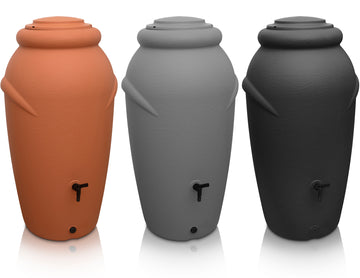
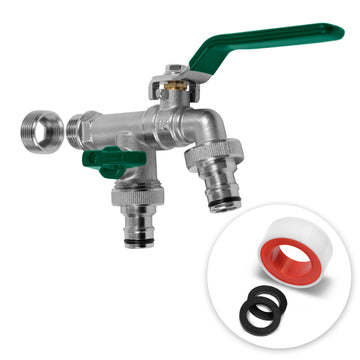
![Drei hohe YourCasa Regentonne 240 Liter [Wellen-Design] - Frostsicher & UV-beständige Gartentöpfe in den Farben Schwarz, Grau und Terrakotta, jeweils mit Drainagesystem für nachhaltige Bewässerung.](http://yourcasa.de/cdn/shop/files/ohnelogo_b8aeecac-557e-4106-a999-e77dcd160209.jpg?v=1707130230&width=360)
